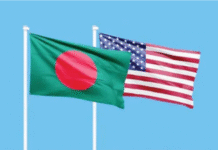U.S. Pulls Military Assistance to Myanmar Over Rohingya Abuses
But experts say the measures will have limited effect and could even backfire.

Washington announced it will end military aid to some Myanmar units involved in the forced displacement of the Rohingya minority, but experts say the move will have limited impact — and could even backfire on U.S. efforts to end the crackdown, which has driven more than 600,000 people from their homes.
State Department spokeswoman Heather Nauert said the United States will not permit units and officers involved in operations in Myanmar’s Rakhine State — the homeland of the Rohingya and the epicenter of the atrocities — to receive or participate in any U.S. assistance programs. The United States rescinded invitations for senior Burmese security forces to attend U.S.-sponsored events and urged Myanmar to grant the international observers and media unrestricted access to the sites of alleged abuses.
The State Department is also considering targeted sanctions on Myanmar officers and officials linked to the atrocities.
“We are assessing authorities under the JADE Act to consider economic options available to target individuals associated with atrocities,” Nauert said, referring to the 2008 Block Burmese JADE (Junta’s Anti-Democratic Efforts) Act.
The Donald Trump administration is struggling to respond to Myanmar’s crackdown on the Rohingya, which has cast a pall over the country’s democratic opening and emergence from decades of international isolation. After Naypyidaw permitted a limited political opening and pushed through some reforms, the United States lifted economic sanctions on Myanmar in 2016.
While Nauert underscored the United States’ “continued support” for Burma’s democratic transition, patience with the crackdown is running thin.
Last Wednesday, Secretary of State Rex Tillerson said the United States held Myanmar’s military leadership accountable for the atrocities perpetrated against the Rohingya. On Tuesday, the Associated Press reported that U.S. officials are working on a recommendation for Tillerson to qualify the plight of the Rohingya Muslims as “ethnic cleansing,” a move that would increase pressure on the Trump administration to re-impose sanctions on Myanmar.
The Myanmar government, meanwhile, continues to imply that the Muslim Rohingya are not rightful citizens of the Buddhist-majority country, referring to them as “Bengalis,” while the country’s military leaders portray the Rohingya as sympathizers of Muslim extremism.
In the meantime, withdrawing U.S. military assistance is of limited use and could even be counterproductive, experts say.
“The Burmese military lived for decades under crippling sanctions,” said Zachary Abuza, a professor at the National War College in Washington. With the United States having very few military ties to begin with, he said, the U.S. move is largely symbolic.
The article appeared in the Foreign Policy magazine on |









